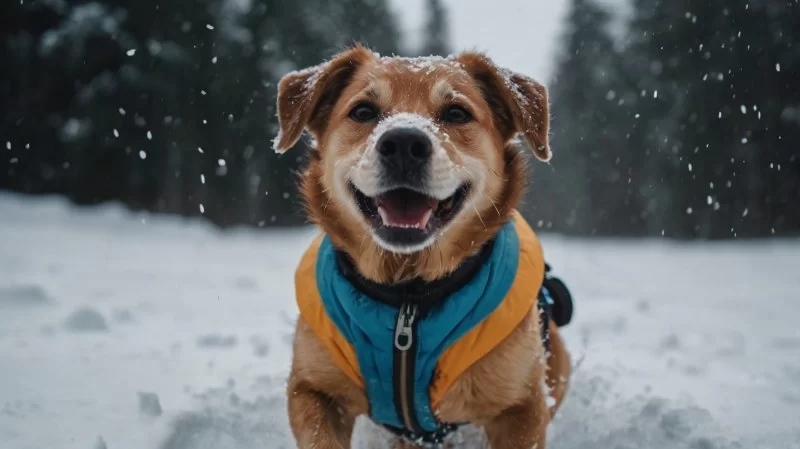1-Understanding-the-Risks-of-Cold-Weather-for-Pets
2-Preparing-Your-Pets-for-Winter
3-Keeping-Your-Pet-Warm
4-Winter-Health-Tips-for-Pets
1. Understanding the Risks of Cold Weather for Pets
As temperatures drop, it's important to be aware of how cold weather can affect your pets. While pets may have fur coats, extreme cold can lead to health risks such as frostbite, hypothermia, and dry skin. Older pets, puppies, and small breeds are particularly vulnerable.
Many pet owners assume that their dogs and cats are fine outside during the colder months, but this is far from the case. Animals can suffer just as much as humans in sub-zero conditions. Even when your pet is indoors, cold drafts, low humidity, and changes in air quality can cause issues.
2. Preparing Your Pets for Winter
The first step in preparing your pet for the colder months is to ensure they are adjusted to winter conditions. Gradual acclimatization can help. Start by limiting their time outdoors to prevent exposure to extreme cold. Make sure their coats are in good condition for insulation, and if necessary, consider getting a winter jacket or sweater for extra warmth.
2.1 Grooming and Coat Care
A well-groomed coat is essential to keep your pet comfortable. Long-haired pets may need regular brushing to prevent mats, while short-haired breeds might require extra layers during the winter. Consider visiting a groomer to ensure their fur is healthy and ready for the season.
2.2 Healthy Diet and Hydration
Cold weather can affect your pet's metabolism. Ensure they're getting a balanced diet with added nutrients to support energy and immune function. Additionally, make sure your pet has access to fresh water, as dehydration can still happen in winter despite the colder temperatures.
3. Keeping Your Pet Warm
Ensuring that your pet stays warm is crucial during cold weather months. This doesn't just mean providing them with a cozy indoor space but also ensuring they are comfortable when outside.
3.1 Insulating Your Home for Pets
While most pets prefer to stay inside, make sure your home is warm enough for them. If you have pets that sleep outdoors or in garages, consider insulating their shelter. Providing a bed with blankets or heated pet pads can also help keep your pet cozy.
3.2 Protective Clothing for Pets
Just like humans, pets can benefit from protective clothing during colder months. Consider buying jackets or boots for pets who may be sensitive to the cold or have short coats. Dogs with thin fur are especially at risk of getting cold quickly. These simple items can make a big difference in their comfort and safety.
3.3 Monitor Outdoor Time
When your pet goes outside in cold weather, limit the time they spend outdoors. Cold winds can strip away their body heat quickly. If your pet loves walks or playtime, consider short, frequent sessions instead of long outdoor activities. Always keep an eye out for signs of discomfort, such as shivering, which indicates they need to come inside and warm up.
4. Winter Health Tips for Pets
During winter, pet health can be impacted by factors beyond just the cold weather. Dry indoor air, salt, and icy surfaces can all be problematic for your furry friends.
4.1 Protecting Paws from Salt and Ice
Salt used to melt ice on roads and walkways can be toxic to pets. If your pet walks outside, be sure to wipe down their paws after walks. Dog booties can also protect their paws from the harsh chemicals and cold ground.
4.2 Watch for Dry Skin
The low humidity in winter air can dry out your pet's skin, leading to irritation and itchiness. To help combat this, consider using a humidifier indoors and moisturizing your pet’s skin with pet-safe lotions. Regular brushing also helps to maintain a healthy coat and prevent flakes from building up.
4.3 Keep an Eye on Activity Levels
Winter months can often lead to less activity for pets, but it's essential to keep them engaged in some form of exercise. Shorter, indoor play sessions can help burn off energy without exposing them to the cold for too long. Keep their body and mind active for overall health.
During the winter months, make sure to take extra care of your pets by following these guidelines. At Hidden Brook Veterinary, we provide resources and products to help you keep your pet safe, healthy, and comfortable through the coldest months. Whether it’s warm clothing, special diet recommendations, or health tips, we’re here to guide you in taking the best care of your furry family members.












